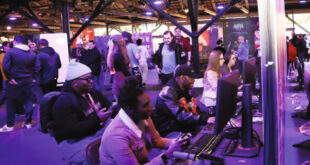Well that was an interesting year. According to most commentators, not the best in terms of marquee games, but, as ever, plenty of evidence in the games we did get that the industry is as creative and forward-looking as ever. If nothing else, 2023 will be every bit as fascinating when we come to look back on it.
It wasn’t just about the games of course. Events were back in a big way (apart from E3 of course), NFTs went away just as spectacularly, and we had the year-long soap opera of Microsoft and Sony’s custody battle over Activision Blizzard. How those played out from a comms perspective and what will shape the PR challenges in the year ahead is the subject of this month’s panel. Next up are Kirsty Endfield and Natalie Bahbout from Swipe Right. Enjoy!
E3 aside, it was a full house for live events last year. How do you see expos, conferences and other game events panning out this year?
Kirsty: It was only the second half of 2022 that felt like business as usual. For the first half events were either scaled back or had fewer attendees. 2023 will be a pivotal year for a number of events companies to show they have returned to their original glory. Before covid hit there were almost too many to attend, each with high price points and those price points have increased dramatically. While events can be pivotal from a marketing and networking point of view, companies haven’t had to spend on events, and I would anticipate they would be very selective for 2023, determining which actually make the most sense to invest in and what will give them the best ROI. By 2024 we might see some big shifts in the calendar, with a consolidation of events as we find our footing in 2023.
How else did the PR landscape change during 2022?
Natalie: 2022 was the year that most of the PR world started embracing ‘the new normal’, returning to events, networking and travel, going back to the office consistently, etc., but combined with the new skill set we developed in lockdown. Whilst clients are returning to events and hosting in-person trips, we’re combining these with remote and hybrid opportunities as standard, meaning comms teams are operating more globally. During the pandemic we were building relationships purely digitally and working more flexibly which lowered geographical barriers and meant we were able to expand our network to new and hard-to-reach territories, and this has continued as the world has opened back up. This is especially important for smaller brands and indie publishers as it can offer more international exposure without the need for multiple local agencies.
There were some spectacular U-turns earlier in the year as gaming companies climbed aboard the NFT hype train, before jumping off again before the next stop. What went wrong for them?
Kirsty: As an industry it makes sense for us to explore new ways to finance games and build out their in-game marketplace. We’re also an industry that loves collectibles, so on paper NFTs should be received positively. But there are a number of concerns around security as there are no regulatory bodies yet given regulation is somewhat counter to the ideals of decentralization. Part of the issue is the NFT market tends to still be largely speculative I.e. people buying them in the hope they’ll increase in value, rather than actually deriving value from them…
I think a lot of people who like collectibles traditionally collect because they derive value from them, and this speculation alienates these individuals. This combined with the environmental impact is driving a lot of the backlash. While there have been successes, for those that went wrong it’s a general misread of their respective communities and a lack of understanding of just how deep people’s concerns are.
Gaming and esports fans are typically early adopters but the NFT industry has been plagued by rogue companies and major organisations wanting to make a quick buck. From a PR point of view anything NFT or crypto related is notoriously difficult to gain coverage for. Press sentiment is not to cover it unless there is an epic fail.
Without blowing your own trumpet too loudly, what was your highlight of the last year (2022) in terms of the PR campaigns that were waged?
Natalie: As an industry it makes sense for us to explore new ways to finance games and build out their in-game marketplace. We’re also an industry that loves collectibles, so on paper NFTs should be received positively. But there are a number of concerns around security as there are no regulatory bodies yet given regulation is somewhat counter to the ideals of decentralization. Part of the issue is the NFT market tends to still be largely speculative I.e. people buying them in the hope they’ll increase in value, rather than actually deriving value from them… I think a lot of people who like collectibles traditionally collect because they derive value from them, and this speculation alienates these individuals. This combined with the environmental impact is driving a lot of the backlash.
While there have been successes, for those that went wrong it’s a general misread of their respective communities and a lack of understanding of just how deep people’s concerns are. Gaming and esports fans are typically early adopters but the NFT industry has been plagued by rogue companies and major organisations wanting to make a quick buck. From a PR point of view anything NFT or crypto related is notoriously difficult to gain coverage for. Press sentiment is not to cover it unless there is an epic fail.
What are the PR challenges for the year ahead and how will you be preparing to overcome them?
Kirsty: The challenges I foresee aren’t PR specific. The evolution of the workplace is something I think a lot of industries and businesses struggle with. From understanding our younger workforce to creating a more inclusive workplace for women, as an example from my perspective the workplace isn’t set up for women yet in terms of its approach to childcare. With Covid, the boundaries between work and personal lives have been blurred.
It’s become more acceptable to bring work home, and bring our full selves to work including mental health challenges. Navigating these changes within the workplace and adapting policies to accommodate them will present great opportunities, but also challenges to employers over the coming years. Swipe Right is lucky in that we are still relatively small at 25 and we are independent so we can offer flexible working, shared paternity or enhanced maternity, but a number of businesses aren’t set up to support new ways of thinking which in turn makes it difficult to be truly inclusive of different needs.
Natalie: The role of PR will continue to evolve dramatically, which is a constant challenge as traditional media shrinks, but in the games industry specifically this presents opportunities. More than ever, community is king, and PRs need to know how to navigate not just mainstream social media, but reddit, Discord, Twitch, all of these platforms that are essential for the games industry, but also places non endemic brands really want to be seen.
Community management consultation has become more and more integral to what we do and we anticipate this continuing in 2023. As social media, virality, and personality led content creation increasingly dominate the headspace of consumers, the part brands and PRs can play is more complicated. Whilst the traditional PR playbook still has immense value, it’s vital that our team can coordinate a reddit AMA and sense check a meme, as well as create a crisis comms strategy or media train a CEO.
AI is threatening to change the way content is created and received (ChatGPT does a pretty good press release). What are the issues for PR as AI content services become increasingly competent and compelling?
Kirsty: Rather than seeing it as an issue, it’s something we are embracing. As an agency we’re keen to explore new technology that can make our day to day easier and the press releases I’ve seen ChatGPT come up with are better than some of those i’ve read from actual PRs, they summarise news clearly and concisely. However writing a good press release is about significantly more, it requires framing within a broader context, aligning with client values, then it needs to be pitched to people that will care about what you have to say and that you have invested time in building relationships with.
We need to understand the nuances of our clients brand messaging and values, and there is an art to pitching. Knowing who you are pitching to, how to pitch and building relationships isn’t something AI can do. I’m excited by tools like ChatGPT, as it frees up PRs time and enables us to focus on where we really add value.

 MCV/DEVELOP News, events, research and jobs from the games industry
MCV/DEVELOP News, events, research and jobs from the games industry




